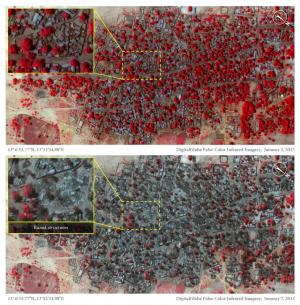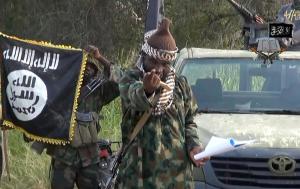The convoy,
seen by an AFP journalist, roared out of the city after Chad's
parliament voted to send armed forces to Cameroon and Nigeria to fight
against the Islamists.
It is
rumoured to be eventually heading to Baga, the town on the shores of
Lake Chad were as many as 2,000 people were massacred by the militants
in a raid on January 7 described by US Secretary of State John Kerry as a
"crime against humanity".
Cameroon's President Paul Biya had
announced Thursday that his Chadian counterpart Idriss Deby had agreed
to send "a substantial contingent" of troops to help Cameroonian armed
forces, who have faced repeated attacks from Boko Haram.The Russian ambassador to the country also pledged to supply Cameroon with more modern weapons to combat the extremists.
The deployment came as the head of the west African ECOWAS bloc called for tougher action against Boko Haram, floating the possibility of a special African Union summit on "a plan of action to deal permanently with the issue of terror on our continent".
Ghana's President John Dramani Mahama said, "We cannot stand by silently, idly waiting for the international community to intervene on our behalf, not when our brothers and sisters are being butchered and burnt in their homes and on the streets of their villages and towns."
A source close to the Chadian army said the force had begun preparing for departure on Thursday.
Boko Haram is fighting to create a hardline Islamic state in northeast Nigeria along the border with Chad, Cameroon and Niger. But it has recently expanded its attacks to neighbouring countries.
Cameroon has been critical of the passivity of the Nigerian authorities and of muted international reaction in the face of Boko Haram aggression.
Since Boko Haram's insurgency began, around 135,000 people have fled the restive northeast of Nigeria, and at least 850,000 have been displaced inside the region.
So far Chad has been spared, but its border is not far from the Islamists' strongholds in the Nigerian state of Borno.
The entry of Chadian forces in the increasingly regional fight against Boko Haram may prove valuable in halting the extremists' sweeping offensives.
- An horrendous slaughter -
After describing Boko Haram as a direct threat to the nation's "vital interests", Chadian leaders moved quickly to deploy units of the country's powerful armed forces.
In 2013 Chadian troops became formidable allies of French forces battling jihadist who had taken control of northern Mali, and played an important role in routing those extremists out into the remote areas of the Sahel.
As they did so, Chadian soldiers gained a reputation for ruthless efficiency in pursuing and liquidating retreating Islamist fighters, and were credited with killing some of the most wanted radical leaders.
One of Chad's main objectives in joining its neighbours to take on Boko Haram is re-taking the northeast Nigerian town of Baga, which the extremist group stormed on January 7 amids reports of the worst atrocities of their six-year insurgency.
Over 3,500 of buildings in Baga and outlying areas are thought to have been razed, with perhaps as many as 2,000 people massacred, and hundreds of people taken captive.
"Boko Haram kidnapped at least 300 women and held us in a school in Baga," a non-identified woman quoted in a statement released Thursday by Amnesty International said.
"They freed the older women, the mothers, and most of the children after four days, but they are still holding the younger women," she said.
On Thursday US Secretary of State Kerry warned that the torment of Baga was a particularly stark reminder of the threat the group poses to the region and world.
"It's an enormously horrendous slaughter of innocent people, and Boko Haram continues to present a serious threat not just in Nigeria and the region but to all of our values and all of our sense of responsibility regarding terrorism," he said.




No comments:
Post a Comment